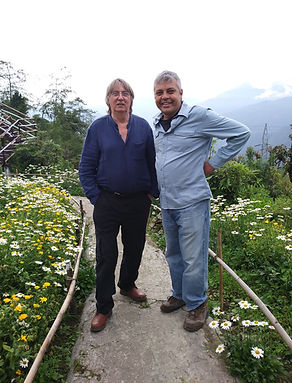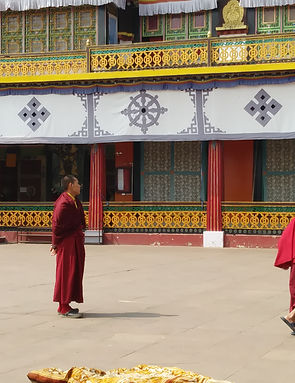top of page
Extract from : "Embedding ESD in textbooks: lessons from a small Himalayan state". Research in Action (Special Edition August) (Johnston, 2019)
At the time of writing (April 2019) the Sikkim Project first phase (February-October 2018) is complete and was an extension of the work undertaken to produce the UNESCO guide for embedding ESD into textbooks. In Sikkim this focused on revising elementary level (Classes I – III) [Environmental Studies (EVS) and Maths in collaboration with the State Council for Education Research & Training (SCERT), Sikkim, India.
My input was as EVS consultant on the UNESCO MGIEP team supporting this project and implementing theoretical frameworks and pedagogical approaches for embedding ESD (see "Textbooks for sustainable development-a guide to embedding."
It would be hard to find greater contrasts between Western concepts of sustainability issues and those in Sikkim - a small, largely rural Himalayan state, with a widespread and diverse society with strong cultural, spiritual and economic links to the natural environment. Embedding ESD in syllabuses and textbooks in such culturally diverse societies and communities as those that exist in Sikkim and many Asia / Pacific countries is no easy task.
Key players in this project were teacher research groups (practising teachers drawn from all over Sikkim) who were instrumental in sensitively and effectively embedding sustainability issues into state prescribed textbooks.
This paper identifies the challenges and shares lessons learnt in the course of this first stage of the project which certainly have transferable value to similar initiatives which might be undertaken elsewhere. Johnston, (2019) Embedding ESD into elementary stage textbooks: lessons from a small Himalayan state. Research in Action Special Issue .
Concepts of sustainability and well-being take on a different meaning when stepping outside of Western developed countries. Although many of the issues have the same root cause the consequences manifest themselves in very different ways. It becomes clear that Western definitions of "sustainability" and “well-being” have little in common with what well-being might mean in developing countries, struggling with more existential issues such as safe drinking water, food security and access to basic education and health care. The scented candles and meditative practices of well-being spas have little relevance to these major issues and indeed cast a surreal perspective on sustainability issues that require global attention if achievement of the SDGs by 2030 is to be remotely taken as a reality.
Although Sikkim is very different to other countries worldwide (and indeed other Indian states) it displays many of the conditions which potentially give rise to present-day sustainability issues arising from economic pressures to "develop". It is to their great credit that they have chosen to focus on a sustainable future as the first organic state in India and to prioritise education for sustainable development at all levels.
The first tranche of textbooks following the recommendations described above were completed December 2018 however, the strategies used to produce these are by no means definitive and are still evolving. In summary, it is hoped that these may provide a useful guide for other practitioners engaged in embedding ESD into textbooks in other states and countries and perhaps even here in the UK. It is refreshing to note that in Sikkim sustainability means for them more than just a search for an on-going sustainable economic paradigm through environmental awareness and resource utilisation but also considers many other key issues associated with equality of opportunity and social justice and peace as articulated by the SDGs.
Ron Johnston 2019

Geography of Sikkim. (Google maps 2018)

EVS writing team 2018

Dr. Shanti Ram Adhikari & me.
(Environmental Science 2018 workshop)


EVS writing team 2018
Interdisciplinary writing teams, SCERT Gangtok 2018 EVS :Maths:Language and institute directors.

Add your own title !!!
UNESCO MGIEP partners with Sikkim Government to develop textbooks for sustainable dev.
https://mgiep.unesco.org/article/unesco-mgiep-partners-with-sikkim-government-to-develop-textbooks-for-sustainable-development
Pictures and initiative from Sikkim (links below)
"Will organic revolution boost farming in India?"
India's first fully organic state Sikkim to now have institute on Organic Farming
Sikkim bans disposable polystyrene food ware, but enforcement is a challenge


.jpg)
.jpg)
My thanks to friends and colleagues from Sikkim who made my visits so memorable.
.jpg)
Sanjal & me
The Buddha's Head and the Buddha's feet at dawn.
(Ravangla 2019)
.jpg)



bottom of page